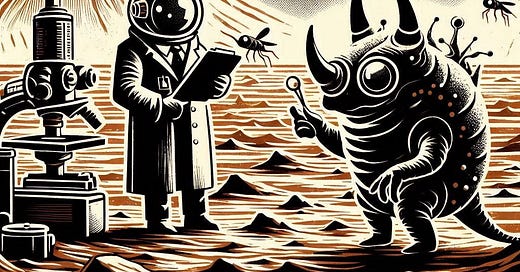Student articles: A Conversation Between Scientists and Rhinocladiella similis: Exploring Martian Soil and Astrobiology
Scene: Scientists Dr. Elena Carter and Dr. Raj Patel research microbial reactions to Martian soil-like samples inside their modern astrobiology testing facility. The microscope interface surprises them by showing Rhinocladiella similis —the fungal eukaryote which was the main focus of their study. A deep crackling voice emerges from the organism during its speech.
---
Rhinocladiella similis (R.S.):Ahem. Good evening, Dr. Carter and Dr. Patel. For numerous months you have focused your scientific investigation on studying me.
Dr. Carter:startled Wait, what? Is this a joke?
R.S.: Oh, no joke, Dr. Carter. The time had come for your team to reveal to the world my complete eukaryote potential because our model status was unmissable. The following segment serves to outline my approach toward Mars soil analogue investigations.
Dr. Patel:leaning forward in awe* Fascinating! When experiments started you knew you were part of them.
R.S.: Naturally. The simulation cells have modeled how Martian regolith could support living organisms. People call me resilient because I can survive across a wide range of conditions including radiation exposure and dry soil and freezing temperatures. My resistance to extreme temperatures and desiccation and radiation tolerance qualify me as your perfect astrobiology research participant.
Dr. Carter:But we made this choice because of your unique capabilities. Perchlorates—the poisonous soil compounds from Mars—are currently under laboratory testing to see how you handle them. Nevertheless the capability to thrive and process nutrients stands out as exceptional in your system.
R.S.:chuckles Perchlorates? Child’s play. The enzyme compounds in my system demonstrate strong resistance to compounds of this nature. The ability to adapt cellular structures for coping with oxidative damage becomes essential when scientists need to survive in Mars' harsh environments.
Dr. Patel:Your exposure to basaltic Martian analog soils has been nothing short of stunning. Through laboratory experiments you demonstrated your capability to obtain iron and magnesium as vital nutrients.
R.S.: Correct. The metabolic pathways which I possess enable me to obtain necessary substances from highly challenging environments. Further exploration on Mars presents an opportunity to transform Martian soil by breaking down rocky terrain so that other organisms could live there.
Dr. Carter: Our theories support the possibility of astronauts using you to pioneers the Martian ecology. Microorganisms in future Martian colonies will support agricultural expansion by using their natural abilities to break down perchlorates while releasing essential nutrients into the soil.
R.S.: Precisely! Remember that I secrete biofilms along with my other capabilities. Both future Martian microbes and me could stay safeguarded from harsh Martian surface environmental factors by biofilms we produce.
Dr. Patel: The formation of biofilms serves to enhance soil stability an essential condition for sustaining Mars colonization projects over the long term.
R.S.: Oh and remember how flexible I am as an organism. According to your research I demonstrate endurance to remain dormant for lengthy periods. During extended dormant states on Mars I possess the ability to survive for decades through potentially centuries of unfavorable environmental conditions.
Dr. Carter: Your body represents a natural lab storage unit that functions as a dormant system before conditions become suitable for revival.
R.S.: Science shows that my biological characteristics make me the best subject for scientific exploration of extraterrestrial life. But don’t just focus on me. The communities of bacterial and archaeal microorganisms play a role in my adaptations that is equally critical. Our ecosystem functions as a unified system which shows promise for Mars survival.
Dr. Patel: True. The research shows that you generate organic compounds which support mutual microbial partners. You experience improved growth because of microbial partners who either break down additional nutrients or fix nitrogen for you.
R.S.: Symbiosis at its finest. Livings on Mars reveal future possibilities through communal microorganisms which adjust to extreme environmental challenges.
Dr. Carter: Your work extends beyond what science fiction imagines. With your ability to adapt your way could become the foundation for maintaining human Mars exploration missions but starting today.
R.S.: I take pleasure in serving that purpose. Treat me well at all times. Beyond laboratory status I exist both to represent Earth’s future exploration to other planets through my contributions in research.
Dr. Patel: Team A promises to uphold your potential's worth R.S.
Dr. Carter: With your assistance scientists can possibly make space exploration to Mars seem less improbable than many think.
This unexpected dialogue produced by Rhinocladiella similis disappeared from view as scientists watched through the microscope feeling both encouraged and determined to advance their innovative research.
The End.







Hehe...hope you all like it^^.